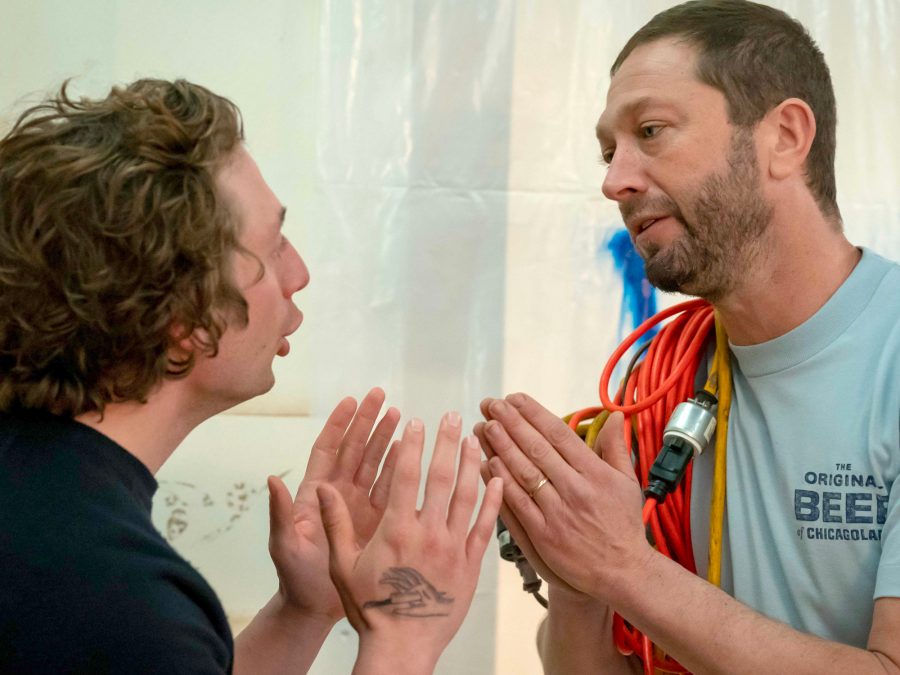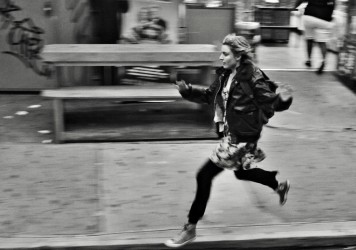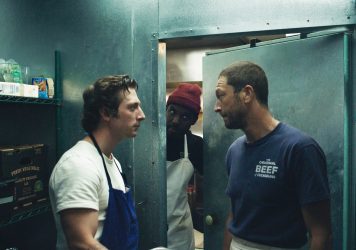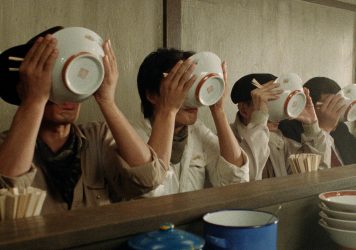As chefs Carmy and Syd grapple with the weight of their own expectations and ambition, their friends struggle to find a vocation at all. This candid approach to the difficulty of finding a purpose feels quietly refreshing in pop culture.

If you don’t know what you want to do with your life by the time you’ve left your teens, you might get the feeling that you’re somehow falling behind. Despite the fact that you’re still pretty young, society expects you to have it all worked out: the degree, the career, the full five-year plan. Often an unattainable goal, the pressure leaves many feeling lost and directionless from an early age.
This phenomenon is something thoroughly explored in FX’s sleeper hit The Bear. In season one, we’re introduced to Carmen ‘Carmy’ Berzatto (Jeremy Allen-White) and Sydney ‘Syd’ Adamu (Ayo Edebiri) who have, on paper, managed to achieve this almost impossible feat. Carmy has won a James Beard Award and is widely regarded as an up-and-coming presence in the culinary world. Syd, a Culinary Institute of America graduate, has already had a bittersweet taste of success – the catering business she established failed in part due to overdemand for her services.
Young, talented and sure of their paths from a young age, successful both academically and practically, and passionate about their work, it would be easy to assume that Carmy and Syd would be happy. But this is The Bear, and although the show allows itself occasional moments of fantasy (how did the money get into the tomato cans?!) the show is grounded in reality – where achieving your dreams presents a new set of nightmares.
Carmy, in particular, is miserable. Aside from the fact that his family’s a mess and the restaurant industry is floundering, he ends up unable to truly enjoy what he does. He’s under constant pressure to exceed himself, talking to Syd about the “panic” he felt after receiving three Michelin stars in New York: ”Your brain bypasses any sense of joy and just attaches itself to dread,” he recalls. Now that he’s achieved this goal, expectations rise and the fall from the top will only be more devastating. Success at a young age has left him in a constant state of anxiety, fearful that everything he’s built for himself could crumble in seconds.
Flashbacks and references to his time as a chef in New York are a horror story of anxiety and insecurity. Despite knowing just how damaging this level of dedication is, Carmy passes on the necessity of entire devotion to the restaurant to Syd. Without it, he assures her, the Michelin star that she dreams of is impossible. The younger chef already mirrors Carmy’s anxious tendencies, giving a concerning glimpse of what may lie ahead for her character.
Amidst the chaos of the restaurant refit, cousin-to-all Richie (Ebon Moss-Bacharach) questions Carmy on his body-and-soul commitment to his career: “You love it,” he says, to which Carmy replies, “Yeah, but it’s not fun for me.” There’s so much pressure on him to exceed the standards he has set for himself that much of the actual joy of cooking is gone, replaced by obligation and the need to live up to others’ expectations. “I don’t need to provide amusement or enjoyment. I don’t need to receive any amusement or enjoyment,” he says in his final, heartbreaking monologue of the season. “I’m completely fine with that. Because no amount of good is worth how terrible this feels.” Making it this far on the path to success has come at the cost of everything else – a personal life, well-being and happiness. Allowing himself those things now would undermine the myriad sacrifices he’s made.

While Carmy and Syd are dogged by the fear of failure and are constantly trying to outdo their past selves (whether through business success or culinary prowess), other members of the team approach their work from a different angle. Although they all have a vested interest in the restaurant’s success (neatly illustrated in episode eight’s montage), they’re also discovering their passion and talent for a certain aspect of the business for the first time. Starting from the ground up, a lot of the pressure is off. They aren’t trying to live up to lofty aspirations, they’re not competing against anyone – they’re doing this work, learning and evolving because they love it.
Tina (Liza Colón-Zayas) is a prime example of this. Once a reluctant subscriber to Carmy and Syd’s strict brigade style in the kitchen, season two sees her promoted to sous chef, flourish in culinary school and be deemed worthy of one of Carmy’s special knives. Her love for culinary school is visible from the second she puts on her new chef’s whites, and her broad smile as she’s complimented on filleting a fish by a teacher and her sauce is given no notes by Syd demonstrates just how fulfilling this job is for her.
Stepping away from the stoves, Richie’s season two storyline is where the show’s message of finding purpose gets interesting. While Carmy suffers from having found his calling, Richie suffers from a lack of it. Richie finds it difficult to really understand his friend, whose unwavering passion for cooking dictates his life. This also drives some of his frequent annoyance at Carmy, the roots of which are seen in the flashback to a far-from-peaceful Berzatto Christmas (season two, episode six, ‘Fishes’). His best friend’s kid brother has his life apparently sorted out, and has moved to New York to become a big shot. Meanwhile, Richie’s relationship is showing cracks and he’s having to beg Uncle Jimmy (Oliver Platt) for a job, already fearing that he’s wasting some untapped potential.
It’s not until season two’s seventh episode that Carmy and Richie’s viewpoints align. Initially, Richie hates his work experience in a Michelin-star restaurant, forced to wake up before dawn to polish forks in an exercise that seems beyond monotonous, but once he sees that the team’s minutely meticulous work and unwaveringly bespoke service brings people pure joy, his scepticism seems to fade away.
From yet again being an outsider in a world that feels far from the one he knows, by the end of the episode Richie has forged real bonds with the staff and has found something he excels at. From his fears in the first episode that Carmy and the team will “drop this ass” once they realise his self-perceived uselessness, his departure from the restaurant is met with assurances that he is valued and will be missed. It’s one of the few times we see Richie truly happy, and presents a more positive outcome from finding one’s calling than Carmy and Syd’s anguish.
The Bear posits that not only is it never too late to start – something we’ve heard a thousand times before – but adds that starting too early could be far more damaging. Characters who have found their calling at a young age tend to end up wrecked, whereas those who find their callings later on, like Tina and Richie, thrive as a result of their newfound passions and genuinely enjoy what they do.
It’s a reassuring message for anyone who hasn’t got their life worked out before they leave their teens, but as with anything in The Bear, it’s not certain how long the positivity will last. This season’s finale sees dessert chef Marcus (Lionel Boyce) miss vital personal calls as his cooking triumphs, while Syd throws up outside after the restaurant’s friends and family opening. Whether Carmy’s fate is escapable for the rest of The Bear’s team is currently unknown, but one thing’s for sure – even if they’re having a terrible time, they’re going down doing what they love.
Published 19 Jul 2023

By Anton Bitel
Ahoy sexy! In which the great Greta Grewig stakes a convincing claim to the thrown of most loveable living screen actress.

By Henry Boon
This year, one television series and one film have captured the highs and lows of working in a professional kitchen.

By Anton Bitel
Juzo Itami’s ‘ramen western’ Tampopo – finally out on Blu-ray – is a culinary romp like no other.